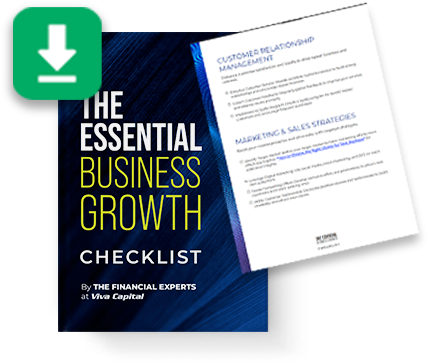
Around two-thirds of small businesses require some form of financing, according to the latest Small Business Credit Survey. Most apply for traditional bank loans and lines of credit. Unfortunately, most don’t get the funding they need.
Invoice factoring is a business funding alternative. Only three percent of businesses apply for it, but it can be a transformative experience for those who do. We’ll go over who it works for best and how it helps on this page.
What is Invoice Factoring, and How is it Used?
Invoice factoring is like getting a cash advance on your accounts receivables or B2B invoices. The process of factoring your invoices is simple.
- You partner with an invoice factoring company.
- A customer places an order with you, and you verify their creditworthiness with your factoring company.
- You complete the work or deliver goods as you normally would and then sell the unpaid invoices to your factoring company at a slight discount. You get paid most of the invoice’s value right away—often on the day you submit the invoice.
- Your client pays the invoice factoring company, and the factoring company sends you any remaining funds.
Key Benefits of Invoice Factoring
Factoring doesn’t work like bank loans or other forms of financing, so the benefits are unique.
Factoring is Debt-Free
Your clients clear the balance when they pay their outstanding invoices, so your business doesn’t accrue any debt. That means you’re always moving forward and not stuck paying off the past interest and fees you accrued.
Approval is Fast
Whereas traditional loans can take 30 or more days to clear, you can get approved to factor within a matter of days—sometimes sooner if you have common business documents ready.
You Can Get Same-Day Funding
Again, banks and other lending institutions can take weeks or months to send cash. That may work if you’re planning for a large expense but not if you need to cover payroll or deal with an emergency. With factoring, you can get paid the day you submit your invoice.
Factoring is Flexible
You’re in control of which invoices you factor and when to factor them. For example, you could sign up today and then not factor an invoice for six months, start factoring all your invoices, or just factor certain ones.
Small Businesses and Startups Qualify
It’s difficult for small businesses and startups to get funding. Around a quarter apply and still have a funding shortfall because they don’t get the level of support they need per the Small Business Credit Survey. Roughly 30 percent need funding but don’t bother to apply for reasons like debt aversion or a belief that they won’t qualify.
Conversely, most companies qualify for factoring because it’s their client’s creditworthiness that matters rather than their own.
9 Businesses You Didn’t Know Could Use Invoice Factoring
It’s probably easy to see how factoring can benefit all types of industries and businesses now. However, a few types do especially well with this form of alternative funding because of how they work or the clients they serve. Let’s take a look at what industries use invoice factoring the most.
1. Manufacturing Businesses
Manufacturing businesses typically have large cash outlays at the start of a project. For example, you may have to purchase new equipment and materials. Labor is another upfront cost. It can take weeks or months to have a product ready and submit an invoice to the client, which might take another 30, 60, or 90 days to pay.
With manufacturing factoring, the business can get paid as soon as the invoice is generated, avoiding lengthy payment delays. It can take that cash and apply it to materials or equipment for the next order, use it to finance the acceptance of larger orders, or address any other immediate financial need.
For businesses seeking additional funding options, equipment financing solutions for manufacturers can provide the capital needed to purchase essential machinery and tools, ensuring projects remain on schedule and operations run smoothly.
Manufacturing businesses benefit from invoice factoring, but industries like construction also see advantages. General contractor financing solutions, such as Viva’s Quick Pay, help contractors fund projects and pay subcontractors promptly, ensuring smooth operations.
2. Wholesale & Distribution Businesses
Wholesalers purchase goods in bulk from manufacturing companies and resell them to retailers and e-commerce companies. That means they can be “hit” on both sides with cash flow issues. There’s a large cash outflow at the time of purchase and often a delayed cash inflow or even trickle as retailers pay for their orders. Factoring gets cash into the business quicker, so it can turn that into more goods that may be resold. It also allows wholesalers to place larger orders that qualify them for increased bulk discounts and improve profitability overall.
3. Freight Brokers and Trucking Companies
Virtually all goods will spend some time on a truck as it moves from a manufacturing company to a retailer or consumer. However, it’s the trucking company’s responsibility to ensure their vehicles are road-ready, cover gas, and pay the driver. An invoice isn’t generated until goods reach their final destination, and then it can take months for the recipient to pay. Large trucking companies can often temporarily absorb the cost. However, 86 percent of trucking companies have just one to six power units, and many are owner-operators. It’s very difficult to absorb costs without volume. It’s hard to qualify for funding as a small business too.
With transportation factoring, trucking companies and businesses in the transportation industry can get paid right away. Some factoring companies like Viva also offer money-saving perks like fuel cards. A similar process exists for brokers too.
4. Logistics Businesses
Logistics companies have similar concerns to trucking companies, but their efforts span the full supply chain. The bracket includes freight companies, freight forwarders, carriers, and third-party logistics companies, also known as 3PLs. As a result, they may be responsible for packaging, warehousing, and shipping goods. Technology to oversee it all and labor add to expenses. Factoring helps them get paid quicker so they can keep goods moving.
5. Staffing Agencies & Recruitment Firms
Staffing companies invest a great deal in finding qualified candidates and getting them ready to work. They’re also responsible for covering payroll and other expenses while waiting for the client to pay. It can be challenging because clients don’t always pay consistently or in a timely manner, but agencies risk losing top talent if they’re not paid consistently.
With staffing factoring, firms can tap into funding as needed and address seasonality issues, so businesses can continue uninterrupted even when clients are slow to pay.
6. Security Firms
Security firms have many of the same challenges staffing companies do. There’s recruiting, onboarding, training, and deployment, plus payroll expenses as agents work. It can also be difficult to scale without cash in hand.
The flexibility, easy qualification process, and speed of factoring make it an easy choice for security firms.
7. Oilfield Services
When people think of the energy industry, it’s typically Big Oil that comes to mind. However, there is a myriad of small businesses supporting the energy industry. The catch: though these businesses are essential to keeping the country powered, their invoices are often sent to large companies that may require several people to sign off before payment is made. It’s common for businesses to wait 30 or more days for payment while they’re covering equipment, payroll, and other business expenses.
There are several benefits to oilfield factoring. Approval is fast and easy. Funding is quick. The business can tap into cash as needed. It also enables smaller companies to accept larger, more lucrative contracts and grow.
8. Healthcare Companies
There are two main forms of healthcare factoring. With traditional factoring, the healthcare company gets paid for its B2B invoices faster. It’s ideal for all sorts of businesses ranging from durable medical equipment companies to labs that might otherwise be held back by slow payments from providers. However, providers, such as nursing homes, physicians, and hospitals, also leverage it to accelerate payment when their money is tied up with large institutional payers.
Reverse factoring is the second form. It’s not offered by many factoring companies but is one of Viva’s many services. It helps companies pay their suppliers, maintain relationships, and ensure the facility has everything it needs to continue providing top-notch care without being strained by excess payables.
9. Service Providers
Service providers, such as consultants, accountants, IT professionals, and janitorial companies often struggle to get funding. They rarely have assets they can leverage as collateral and run lean. It’s common for the business to be run and operated by a solo entrepreneur or have a very small team. These create barriers to traditional financing options.
But, seasonality, slow-paying customers, and sometimes payroll or other expenses can leave service providers short on working capital. Sometimes small firms have to turn away clients or large projects because they can’t afford to tie up all their income in one invoice or can’t wait for payment. However, factoring for service providers addresses all these concerns and makes it possible for them to grow.
Help Your Business Grow with Invoice Factoring Services
Whether your business was covered above, or you see the benefits of factoring and want to find out if you qualify, the first step is a no-obligation quote. Request your complimentary quote from Viva to get started.
- 6 Proven Customer Retention Tips to Drive Long-Term Loyalty - June 4, 2025
- 5 Key Traits of a Top Factoring Company (And How Viva Stacks Up) - May 22, 2025
- The Impact of Late Payments: How Factoring Protects SMEs - April 11, 2025



